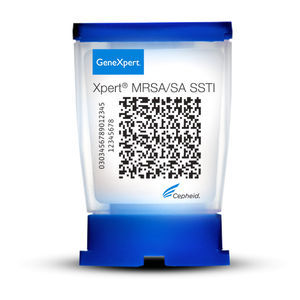
Rapid infectious disease test Xpert® SA for genesStaphylococcus aureusMRSA
Add to favorites
Compare this product
fo_shop_gate_exact_title
Characteristics
- Applications
- for infectious diseases
- Tested parameter
- for genes
- Micro-organism
- Staphylococcus aureus, MRSA
- Sample type
- nasal
- Analysis mode
- for PCR
- Result display time
60 min
Description
Patients undergoing surgery are at increased risk of developing an infection1,2
S. aureus is the most common cause of SSIs1
Colonized patients are up to nine times more likely to develop an SSI1
SSIs are associated with increases in length of stay, cost, morbidity, and mortality1
Traditional direct culture testing takes 24+ hours to produce a result, and may risk under-detecting positive cases2
The Solution
SSIs caused by S. aureus continue to present a substantive burden in healthcare settings, prompting the need for earlier and more accurate pre-admission identification.
Xpert® SA Nasal Complete enables:
Broad coverage with multiple targets, including: the orfXSCCmec junction, mecA gene and spa gene for more accurate S. aureus and MRSA detection
Optimised pre-admissions pathway for improved patient outcomes
Appropriate decolonization measures to reduce SSIs and the development of new resistances
Laboratory efficiencies with on-demand workflows requiring minimal hands-on time
The Impact
Fast and accurate PCR testing with Xpert® SA Nasal Complete greatly improves time to result, allowing healthcare professionals to quickly and appropriately manage pre-surgical admissions, reducing infection risk, transmission, and patient length of stay.
Optimize Workflow and Patient Management
On-demand STAT testing provides results 24/7
Ease of use and minimal hands-on-time enables more efficient use of staff time
Catalogs
Related Searches
- Assay kit
- Blood assay kit
- Plasma assay kit
- Infectious disease detection kit
- Blood rapid diagnostic test
- Molecular test kit
- Virus rapid diagnostic test
- Serum rapid diagnostic test
- Respiratory infection test kit
- Plasma rapid diagnostic test
- Infectious disease rapid diagnostic test
- Clinical assay kit
- Whole blood rapid diagnostic test
- COVID-19 detection kit
- Rapid respiratory infection test
- Urine rapid screening test
- Laboratory software
- Oncology test kit
- Windows medical software
- Bacteria rapid diagnostic test
*Prices are pre-tax. They exclude delivery charges and customs duties and do not include additional charges for installation or activation options. Prices are indicative only and may vary by country, with changes to the cost of raw materials and exchange rates.











